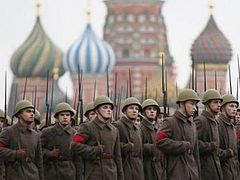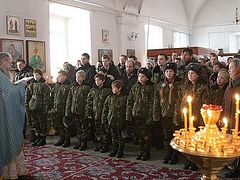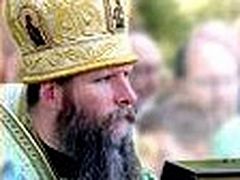Last week the Russian Orthodox Church Outside of Russia (ROCOR) Synod pronounced general Andrei Vlasov, who fled to Hitler’s side, a patriot. “Izvestiya” observer, Boris Klin, discusses this unpleasant event, which astonished the Russian public, with archimandrite Tikhon (Shevkunov), superior of Sretensky Monastery. So who was Vlasov in reality, and why is this new myth trying to penetrate society?
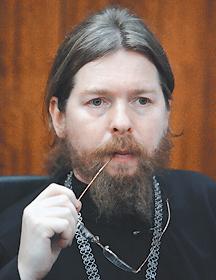
A: At one time the Church Abroad revealed for us the destinies of the last Russian Emperor and his family, the New Martyrs, members of the White Army Movement. Now the Church Abroad presents us with a different figure – general Vlasov… On the one side, this was unexpected, on the other – we suspected that this discussion would arise sooner or later. When preparing for the Unification with ROCOR, we were holding meetings; it was silently agreed not to raise this matter. We looked at it too differently. After all, it was a question no more or less as of our fathers and our grandfathers battling on different sides of the front …
Q: By the way, the reason for the Church Abroad’s statement was due to the publishing of a book by protopriest Georgy Mitrofanov, the dean of the History Department of the St. Petersburg Theological Academy, under the name, Forbidden Themes of Twentieth Century History. In this book author rehabilitates Vlasov and makes him a hero.
A: With reference to this book the words “forbidden themes” are nevertheless a big stretch and more of a commercial trick: the matters raised by the author, including Vlasov, have been openly discussed from different sides for more than twenty years in Russia. It is enough to check the internet in order to confirm it. I mean something else when speaking about “forbidden themes.” It is as not simple; it is like in a big family that lived long through tough times: there are subjects and problems which would not be raised by loving and sensitive member. It seemed to me, in this process of dialogue between us and descendants of Vlasov’s followers, that this problem should be one of these themes. But I can see that I was wrong. After the latest developments and more than persevering accentuation of this question (as it is known, two documents devoted to the published book and Vlasov were accepted at the Synod session and published in the press) it is impossible to refrain from stating my position. Moreover, recently here in Russia, even people on the street approach me with the question: “Father, please explain it? But Vlasov is a traitor! Or is he not anymore?”
Q: The ROCOR statement discusses this: “We are saddened by the glaring vitriol in the arguments surrounding this book, and the contentious and disturbed spirit expressed by some of the critics of this book.” Is the Synod’s objective to tame the passions?
A: Their objective is wonderful. What has been done in order to heal “vitriol,” to cure the “contentious and disturbed spirit”? Two mentioned documents were written. Though it is enough to look into last week’s newspapers or Internet, to read furious disputes, indignation and resentment of many, even to hear or read last extreme measure – damnations, in order to understand that healing has not come about.
Q: “The tragedy is indeed a great one surrounding those who are commonly called “Vlasovites,” that is, the participants in that movement upon which the Russian Freedom Army [Russkaya Osvoboditel’naja Armija, ROA] was founded.” – one more quote from the ROCOR Synod communication. Is it pertinent hear to speak about a tragedy?
A: No doubt, there are a lot of human tragedies behind the Church Abroad announcement, which includes the fates of people who were betrayed and left imprisoned by the enemy. And it is hard not to agree with this. But if only we can put an end to this! Unfortunately, something else happens today: persistent appeal to recognize Vlasov’s choice as the only correct one and that he himself is, a matter of fact, the real hero of the last war; moreover, to recognize him as the hero of the future Russia. And Collaboration is not only possible, but the only right path to serve Russia. Therefore, all others who dare to disagree with this position — those who died on the battlefield, those who worked in the rear, those who died after the War and those who are now living – are no more than rascals and traitors. This is well stated in the declared author’s credo of the mentioned book, which again raises before us the spirit of Vlasov: “Our society consists of people, the majority of whom live with lies, who served evil, and who are now making it seem that they served the truth all their lives. They “served Russia” – whether it was called the Soviet Union, or the Russian Federation; but in reality these people can not honestly andconsecutively cross out their previous lives, like general Vlasov and his followers, and they have been serving not Russia, but only themselves.” Thank God, I will emphasize, that this extreme is not at all the position of the Church Abroad. Today this is our own –be it untamed, unfeasible, imposed; it is an internal dispute.
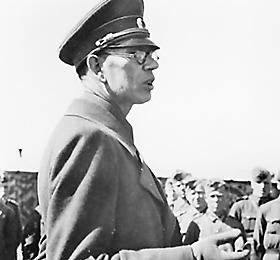 Vlasov
Vlasov A: This is a myth, fairy tail, which Vlasov needed for two reasons – simple survival and justification for himself in his own eyes, as well as in the eyes of his followers and their descendants. Even today this myth is sincerely accepted as a fact by part of people abroad. But it does not cease to be a myth because of this, for the simple reason that there could not have been any talk of confrontation between the Vlasovite “armed forces” and the Germans. It took six (!) years for the enormous, many million-strong armies of the Soviet Union, the U.S.A, Great Britain, and France, which were armed with latest equipment of the time, to defeat the Third Reich’s gigantic military machine. Vlasov’s division, even in better times, consisted of tens of thousands of men. Vlasov was an army general and understood the reality of this fairy tail better, than anybody else.
He had several other fairy tails for Russian people. On December 27, 1942 he declared in Smolensk: “Germany does not infringe on the essential liberty of Russian people and their national-political freedom.” But here is a document from Alfred Rosenberg’s ministry, dated the same year, 1942: “We are talking not only about defeating the state with its center in Moscow. The matter consists, most likely, in crushing Russians as a nation… from the biological, in particular, the bio-racial, point of view.” Apologists affirm that Vlasov did not suspect it. The prominent contemporary writer and philosopher of Russian immigration Ivan Solonevich, who had neither the information available to Vlasov, nor contacts with Hitler’s top men, understood it another way. He wrote: “We, the Russian people who lived in Germany during those years, saw and knew that this was all about the destruction of Russia and the Russian people.” For those who were not deceiving themselves and did not deceive, there were no illusions. That is why another lieutenant-general, Anton Ivanovich Denikin, when he was invited to take part in the movement, answered that he had been serving and was serving only Russia, and never had served or would serve a foreign country.
For the sake of justice, it should be mentioned that German Authorities did not quite trust Vlasov, first of all because they perfectly understood: the one who betrayed will betray again. And that’s the way it happened. Vlasov, who was offered to us as an example to follow, had betrayed not only once. He broke his military oath and deserted to the enemy side, saving his life in German captivity. After three years he was “a staunch fighter with the Bolshevism” who betrayed his new master: in April of 1945 he obligingly sent a telegraph to the staff of our first Ukrainian Front. It read, “I can attack at the rear of the Prague German Group. Condition: amnesty for me and my people.” At the same time he was denouncer, in his own words, of the second enemy of free Russia after Bolshevism, “Anglo-American capitalism.” But he sent his Generals Malyshkin and Zhilenkov to the staff of the seventh American Army division to negotiate capitulation. Finally, under investigation and in court he betrayed his whole new belief with all of his followers: “The crimes I committed are huge, and I anticipate severe punishment for them. The primary sin is capitulation. But not only do I fully repent of that, although it is late, but in court and under investigation I tried as much as possible to reveal the whole group.” This is from his last words in court. The most terrible historical treason was fighting on the side of the enemy of the Motherland and involving his countrymen in fratricide, no matter how beautiful idea was attached to it. It was a serious sin according to human and as Divine laws.
Q: The ROCOR Synod declaration says: “The name of the Orthodox Christian Andrei Vlasov evokes hatred as a result of ignorance of historic fact due to the godless, totalitarian propaganda aimed at falsifying history.” Was Vlasov an Orthodox Christian?
A: Many times I had the opportunity to interact with a man to whom the statement refers in order to prove that Vlasov was Orthodox. It was Protopresbyter Alexander Kiselev. In the most difficult times of war, he helped our men captured in German camps in any way he could. He met with Vlasov as well, and even wrote a book about him. Father Alexander was an absolutely honest man, and in spite of his desire to portray Vlasov in a the good light, in the end he limited himself to the following statement: “I am far from the desire to embellish the image of General Vlasov or any of his associates. But if it is impossible to attribute to most of them deep Church understanding (Tserkovnost’), it is impossible to deny that the majority of these people favorably looked at the Church.” That’s it. Once in 1993 I asked Father Alexander Kiselev, who was named spiritual father of ROCOR, about the most important thing, which is the criteria of whether a person feels that he is an Orthodox Christian or not: “Father Alexander, tell me, did Vlasov come to Confession or Communion?” Father Alexander answered sadly and briefly: “I know nothing about it.” The same was witnessed by Father Alexander Kiselev’s grandson, Priest Peter Holodny. But Father Alexander later answered more clearly and definitely to the same question: “No, Vlasov never went to Confession, and he never went to Communion.” I would hesitate to call somebody an Orthodox Christian if, in spite of having every opportunity to participate in the Sacraments of the Orthodox Church, he consciously did not do it.
Q: Can we just call him a patriot, a decent man, although with a complicated fate?
 Vlasov (at the left) at the meeting with Goebbels, Reich Minister of Public Enlightenment and Propaganda (at the right)
Vlasov (at the left) at the meeting with Goebbels, Reich Minister of Public Enlightenment and Propaganda (at the right) Let’s think for a moment: Russia went through a huge reevaluation of values in the last few decades. The acts of Royal Family and New Martyrs were accepted with repentance, and White Army motivation, even of the most brutal individuals, was understood. Monuments were erected, remains of those, who were considered enemies, were solemnly, with military honors transferred to Russia. Their graves became places for pilgrimage. Ilyin, Denikin, Kapel. But it has not happened to Vlasov. And as an example, it did not happen to another figure – Pavlik Morozov, who would seem altogether different, except for one thing: they are united by treason, which is not acceptible. Forgive them as a Christian, of course! But, in my opinion, only those who lived through that, who were participants or contemporaries of that war, have the human right to forgive. And as bystanders, and not participants of this history, all we can do is to whole-heartedly sympathize with the tragic destiny of all of our unfortunate compatriots. But it is impossible to make them either examples or heroes.
The Synodal document has an amazing spot, which simply struck me: “Under the circumstances they found themselves in, could General Vlasov and the “Vlasovites” have done anything else?” This would mean the choice between inhuman conditions of captivity and of saving lives at the cost of treason. As for those who grew up in Russia during my time (and these were Soviet times, which, according to the document, we should curse and be publically ashamed of), I think any student can still answer this question. He would simply name General Karbyshev, or Zoya Kosmodemianskaya.
Q: Father Tikhon, Vlasov was named a hero not only by several priests. This is not even a personal opinion of one or several hierarchs, but the decision of the Church Abroad Synod. This is the Church with whom we were reunified, and the whole country rejoiced over this reunification two years go. How can people live with this now?
A: It should simply live through it. We should understand, that this topic, which we have to speak about these days, for most people abroad has not healed, and could not be healed, because it is personal pain for close ones and relatives who participated in this movement. And concerning reunification, I am truly convinced that what happened two years ago was absolutely right. And Russia was really rejoicing. I am also convinced that hierarchy of ROCOR and everybody in the Church Abroad are sincerely seeking the best for Russia. And what is more important, they are capable of recognizing their mistakes. This is their big moral, Christian, and human strength. But they live in a different world. If they could understand our realities, they would have never caused us such pain.
Psychology of collaboration is one of the most serious dangers that is willing and unwillingly forced onto today’s Russia. In our days, some historical figures who have passed into the other world long time ago have become a real weapon possessing enormous destructive power, because this weapon is used in order to destroy traditional spiritual identity: evil is portrayed to be good, and treason as a heroism; while real heroism is depicted as ignorance, backwardness, and even sin. This is a part of that spiritual struggle onto which you can not impose moratoriums, which is not limited by any agreements. But if you ask our children in Russia to name the heroes of the War and they name General Karbyshev and not General Vlasov, our country has a future.

